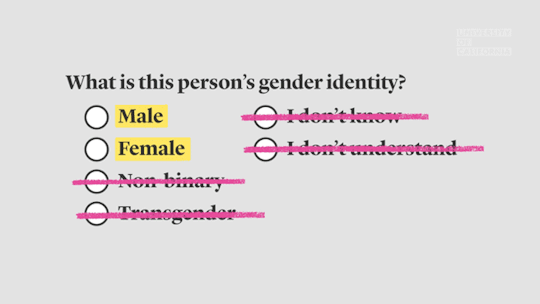We conduct research by and for LGBTQIA communities. Visit our site to potentially participate in our paid online research: https://medicine.yale.edu/lab/pachankis/projects/lgb/screener/
Don't wanna be here? Send us removal request.
Photo

QUEER WOMEN IN NYC!
Wish there were better mental health services for queer women in NYC? Wish you could access affirming therapy from your own computer?
Participate in an online therapy program for adult queer women NYC where you can receive therapy from the comfort of your own home. If eligible, you could receive up to $190 for your participation!
If interested, click here to learn more about the study and answer some eligibility questions: https://yalesurvey.ca1.qualtrics.com/jfe/form/SV_8DsMMolENexxfh3
1 note
·
View note
Video
youtube
How the census overlooks the LGBTQ community
The old expression is “if you aren’t counted, then you don’t count.” And the census, administered every 10 years, is the primary tool by which you are counted.
In 2020, for the first time ever, the U.S. census will ask directly whether adults are involved in same- or opposite-sex married or unmarried partnerships, in order to improve the accuracy of information about the true number of same-sex relationship households in the U.S. Sixteen years after gay marriage first became legal in Massachusetts, and five years after it became legal across the country, it’s a landmark achievement for those who have fought for decades to be recognized as equals.
But, according to Kerith Conron from UCLA’s Williams Institute, it needs to go further.
She estimates that the census overlooks about 80 percent of adults in the LGBTQ community.

If you are a lesbian, but not living with a partner, or if you identify as transgender, you are invisible. If you are a bi- or queer-identified person living with an opposite-sex partner, you are also invisible. If you aren’t living with a same-sex partner, you are invisible.
This creates a huge gap in our ability to understand and provide services to the LGBTQ community, with a particularly high cost for transgendered people, who suffer from a lack of good data and corresponding resources.
Their push for visibility in other surveys has made a difference, according to Conron: “Even doing an analysis of federal funding for transgender research, I’ve seen a major increase in the number of grants funded for transgender folks in the last 10 years.”

And it isn’t as though we don’t know how to ask these questions — the Williams Institute has even developed a series of best practices for doing so.
Despite the shortcomings of the current census, Conron believes that it will eventually become more and more inclusive.
“I am confident that there are many people in federal government that believe inclusive data collection is a priority and that data collection will move forward,” states Conron.
209 notes
·
View notes
Photo

Help us develop an online therapy to promote personal growth and self-empowerment among LGBTQ women. Take our online questionnaire to see if you could be eligible for paid research: esteem.yale.edu/screen
#lgbtq#lgbtqia#queerwomen#queer women of color#transwomen#onlinetherapy#lgbtqtherapy#affirmativetherapy#wlwoc#wlw#queerlove#queer research
1 note
·
View note
Photo

Queer woman in NYC? Take our online screening questionnaire to see if you’re eligible for our paid study: esteem.yale.edu/screen
#umbrella#lgbtquia#queerwomen#queerwoman#lesbian#pansexual#rainbow#lesbiansofcolor#bipoclgbtq#bisexual#asexual#nyc#teletherapy#therapy#affirmativetherapy
0 notes
Photo

Wish there were better mental health services for queer women in NYC? Wish you could access affirming therapy from your own computer?
Participate in an online therapy program for queer women NYC where you can receive therapy from the comfort of your own home. If eligible, you could receive up to $190 for your participation!
If interested, click here to learn more about the study and answer some eligibility questions: esteem.yale.edu/screen
0 notes
